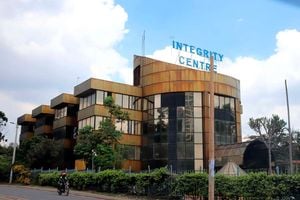Chaotic life in the trenches of Migori's gold mines

Alphonse Onyango, a miner, getting inside a gold pit at Osiri gold mining site in Nyatike, Migori County.
What you need to know:
- Gold mining in Migori is artisanal.
- The miners often dig 400 feet below the ground.
The noisy sound of crushers grinding gravel welcomes us at Osiri gold mining site in Nyatike, Migori County.
There are neatly spread sacks of soil exposed to sunlight to dry, ensuring the grinding process continues, thanks to the harsh midday sun. This is one of the stages in the gold mining process that determines whether the soil contains gold.
Gold mining in Migori is artisanal. It spread across Nyatike, Awendo, Rongo, and Suna West sub-counties. It entails retrieving stones from a primary rock, a process workers say requires energetic people who are psychologically prepared and can withstand the terrifying underground environment. The miners often dig 400 feet below the ground.
"Earning from gold is a long process. I descend into a pit and come out with soil. I take it to a different person, who then sifts the gold. I get paid after the gold is extracted," says Alphonse Onyango, who has worked at the site for six years.
Mr Onyango has a torch fastened around his forehead to light his way inside the dark pit as he keenly steps on the wooden ladder. He tells Climate Action that over the years, he has learnt to differentiate soil that has high and low gold quality . "We do sampling because not all rocks yield similar samples.
There are two types of samples; one is not very productive, while the other produces a lot of soil and less gold," explains Mr Onyango.
Velma Ogwaro, unlike Mr Onyango, has never gone down a pit during her three years at this gold mining site. She is in the processing stage, which involves washing soil from the crusher. Her day begins at 4am when she arrives at the site.
"As soon as I arrive, I begin my cleaning duties. I take a break at 10am to have some tea. By the time I get home in the evening, I'm always exhausted, and sleepy," she says.
Women here, such as Velma, buy gravel from miners and then crush it. While it is believed that their job is lighter, she says it exposes her to health risks.

Velma Ogwaro (Right) alongside other female workers at Osiri gold mining site in Nyatike, Migori County.
""This is my primary source of income, but I am concerned about the harmful chemicals we use. As a young woman still at childbearing age, I am hesitant to continue working here for a long period. However, it all depends on whether or not I can find a better alternative for income," says the mother of two.
Phillip Ooko, 49, is a security guard at Osiri Goldmine. He describes the gold pit as a large city with various markets. He says he is aware that women like Velma are exposed to hazardous chemicals during the washing process.
"There is a small basin where soil and mercury are mixed and separated. Gold is attracted to the mercury, and a small piece of cloth separates the two. The mercury is collected separately, while the gold remains on the cloth," says Mr Ooko.
Gold miners in this area do not have direct access to the market and are at the mercy of middlemen who exploit them. The price of gold is affected by the exchange rate between the dollar and the shilling.
The highest gold price was recorded last December and January this year when the exchange rate was at its highest. During that period, gold was selling at Sh7,500 per gramme.
"The middlemen who buy gold always reduce the price by almost Sh1,500 or Sh2,000 to cover their transportation and other expenses. They have become a major problem for us, but we believe that instead of trying to defeat them, it might be better to work with them," explains Mr Ooko.
Migori County Environment, Natural Resources, and Climate Change Executive Caleb Opondi says the production of gold in the county stands at 34 tonnes per year, which brings around Sh67 billion.
"The mining sector is not contributing much to our county due to the bureaucratic processes and the involvement of the national government, particularly the mining ministry. Additionally, many artisanal miners evade taxation," says Mr Opondi. He adds that gold mining has attracted so many investors in the county who benefit more than the locals.
"The artisanal miners only get 25 per cent of what has been processed and around 75 per cent remains in the waste materials, which are also collected again by other people who use advanced technology to get gold and other minerals. Artisanal miners only aim at getting gold," adds Mr Opondi.
Harmful fumes and collapsing mines are some of the risks that small-scale gold miners like Onyango expose themselves to in their search for gold. Nyatike has reported three mining-related deaths between October and December 15, 2023. Despite the risks, gold mining remains their primary economic activity.
A mining policy is hoped to mitigate these dangers in the future. "The danger of not having a mining policy as a county is that we lose a lot of resources. People mine without looking at their safety. These mines also cause environmental degradation," says Mr Opondo. Migori has since signed a memorandum of understanding with Planet Gold, an NGO, that will help Velma and other women extract gold without using mercury.
Miners and cleaners expect to benefit once policymakers implement a mining policy and mercury-free processing in the county. They believe the two will give them the right to get more value for their gold without risking their safety, health or the environment.




